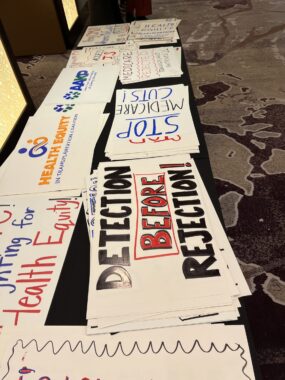New round of taking on Goliath by protesting a Medicare denial
A Washington day of advocacy to call for restored coverage of special blood test

I’ve been involved in equity issues for most of my adult life and have been an advocate for the rare disease community for decades. In the biblical story of David and Goliath in 1 Samuel 17, David had no intention of shying away from Goliath. Neither do I.
Goliath fooled me once this year, but he wouldn’t this time.
Thus, on Dec. 5, at age 66, I did something I’d never done before: I marched to the site of the U.S. Department of Health and Human Services (HHS) in Washington and then on to the U.S. Capitol.
Preparing for battle
In March, Medicare began restricting the use of valuable molecular diagnostic blood tests for post-transplant patients. In July, I’d declared a victory for David when I reported that Medicare had restored the coverage of AlloSure Lung, citing a CareDx press release. But it turns out that while Medicare covers these tests, it’s still restricting longstanding, or recurring, coverage; it won’t cover AlloSure Lung unless it’s being used in place of a biopsy.
So in September, I delivered testimony to two different Medicare contractors regarding my experience as a patient, demanding that coverage be restored.
My connection to this test is personal, as I’m a transplant recipient.
When I was diagnosed with idiopathic pulmonary fibrosis (IPF) in January 2017, I quickly learned that there was no effective therapy or a cure. As my condition worsened over time, my body was growing tired. When I was listed for lung transplantation in March 2021, I was using 7 liters per minute of oxygen. My situation was quickly becoming more dire.
In July 2021, I had my bilateral lung transplant. I don’t know my donor, but this person gave me a second chance at life. Shortly afterward, my care team began using CareDx’s AlloSure Lung blood test to look for early signs of rejection.
But today, almost five months since my July column and three months since delivering my testimony, Medicare coverage of the AlloSure Lung test remains in limbo. It seems like no one was listening.
Detection before rejection

Signs ready for the march on the U.S. Capitol and U.S. Department of Health and Human Services. (Photo by Sam Kirton)
Honor the Gift is “a coalition dedicated to advocating for greater access and coverage for the care and services that ensure the long-term health of transplant patients,” according to its website. The organization brought more than 100 voices of transplant patients together on Dec. 5, and they demanded to be heard.
The protesters, including lung, heart, liver, and kidney patients, represented a true cross-section of the transplant community. They comprised a wide variety of races, ethnicities, and medical stories, all with one thing in common: They all demanded assured access to molecular tests such as AlloSure.
Choosing a test like AlloSure to detect transplant rejection is a no-brainer, in my view. What are some of the differences between it and a biopsy?
AlloSure is a noninvasive test while a biopsy is generally an invasive test.
AlloSure is a blood test while a biopsy procedure typically requires anesthesia.
AlloSure provides results in as little as 24 hours while the results of a biopsy may take up to 30 days.
The most important reason for me, though, is that AlloSure looks for signs of rejection while I’m asymptomatic. A biopsy is normally conducted only when the transplant patient is symptomatic. Thus, using a biopsy to assess the reason for rejection can be too little, too late.
What now
On Dec. 5, we took our signs to the front door of HHS and raised our voices, demanding to be heard. We angled some of our signs upward for the HHS employees who came to look at us through the windows.
We later descended on the Capitol wearing red lanyards to call on the offices of more than 100 of our elected leaders. I was part of a group of seven Virginia constituents who were joined by medical professionals to deliver our message to six of Virginia’s representatives.
Despite our protests, there’s still much to be done. Many patients’ blood tests have been canceled or are no longer being ordered, leaving them unsure if they’re experiencing early signs of rejection. Consider signing on to the Honor the Gift campaign to add your voice to the messaging. You can also sign a letter to your representatives on Capitol Hill through the site.
I demanded to be heard. I ask that you also demand to be heard.
If my Fitbit could talk, I’m confident it’d ask what was chasing us on that Tuesday. I logged 13,866 steps to record 6.22 miles that day. It was a tiring day of protest, but necessary to make every breath count.
If you’ve had a transplant, does your care team use a molecular diagnostic test such as AlloSure Lung? Has it helped predict an increased risk of rejection? Please let me know in the comments.
Note: Pulmonary Fibrosis News is strictly a news and information website about the disease. It does not provide medical advice, diagnosis, or treatment. This content is not intended to be a substitute for professional medical advice, diagnosis, or treatment. Always seek the advice of your physician or other qualified health provider with any questions you may have regarding a medical condition. Never disregard professional medical advice or delay in seeking it because of something you have read on this website. The opinions expressed in this column are not those of Pulmonary Fibrosis News or its parent company, Bionews, and are intended to spark discussion about issues pertaining to pulmonary fibrosis.









Leave a comment
Fill in the required fields to post. Your email address will not be published.